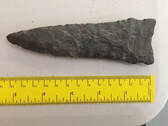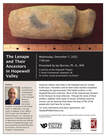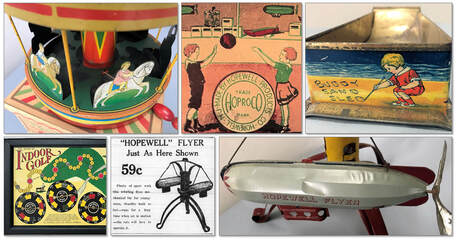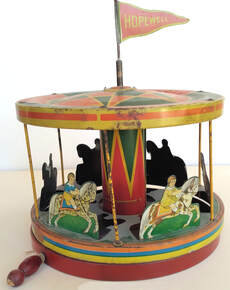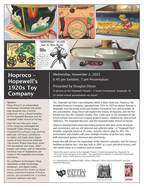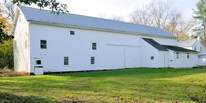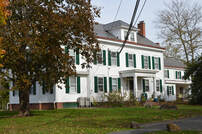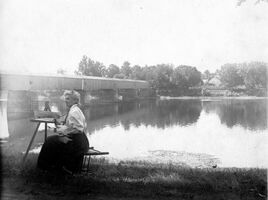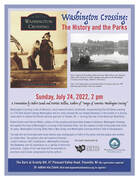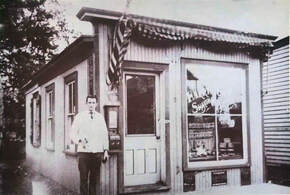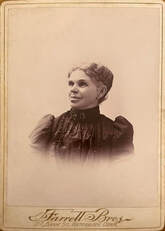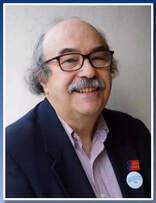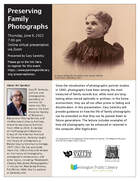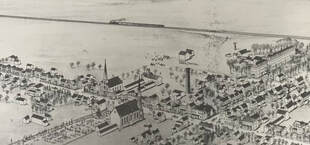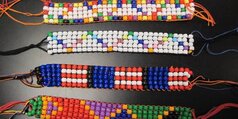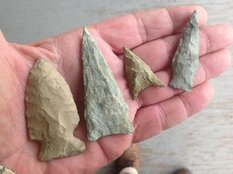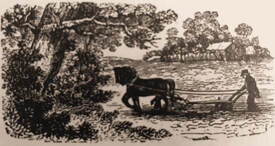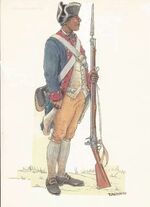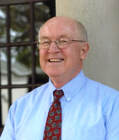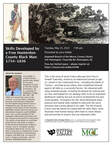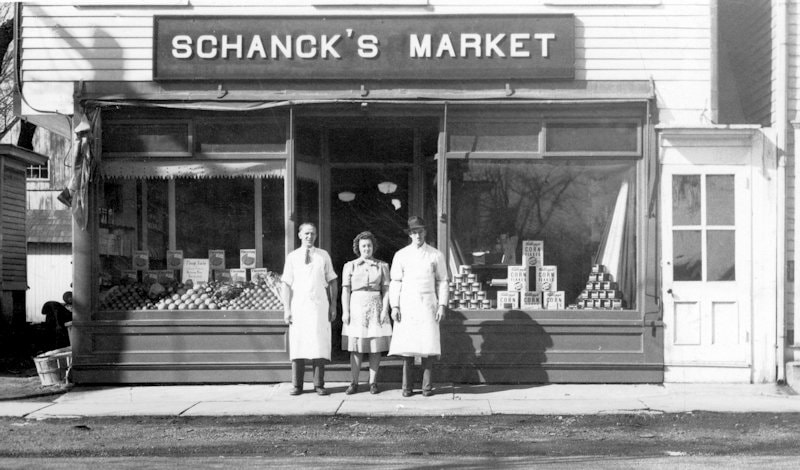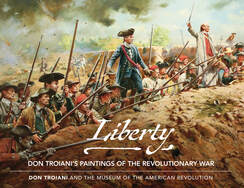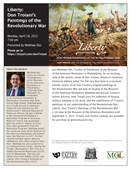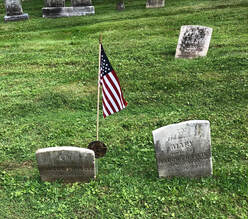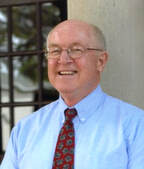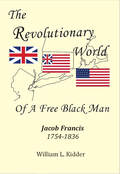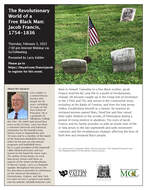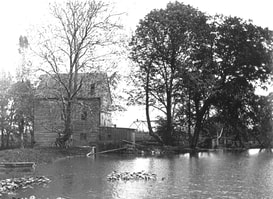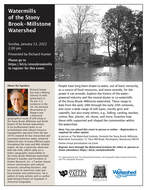Past Programs - 2022
The Hopewell Valley Historical Society regularly sponsors community programs on local history, often in partnership with the Hopewell Museum. These programs typically are free and open to the public.
2022 Programs:
Next: Past Programs 2021
See also:
2022 Programs:
- Wed., Dec. 7, 2022 - The Lenape and Their Ancestors in Hopewell Valley - Ian Burrow - VIDEO
- Wed., Nov. 2, 2022 - Hoproco - Hopewell's 1920s Toy Company - Doug Dixon - VIDEO
- Sun., Sept. 18, 2022 - HVHS Annual Meeting - Drake Farmstead Presentation and Tour - Patrick Harshbarger - VIDEO
- Sun., July 24, 2022 - Washington Crossing - The History and the Parks - Sands & Millen
- Wed., July 6, 2022 - Discovering Local History Online: Seminary Ave. - Doug Dixon - VIDEO
- Thurs., June 9, 2022 - Preserving Family Photographs - Gary Saretzky
- May 21 - 30, 2022 - Hopewell Valley Heritage Week
- Sat., May 28, 2022 - Pennington Historic District Walking Tour - Historic Preservation Commission
- Fri. & Sat., May 27 & 28, 2022 - American Indian Artifacts and Tools - The Hopewell Museum
- Tues., May 24, 2022 - Skills Developed by a Free Hunterdon County Black Man - Larry Kidder
- Sat., May 21 - Mon., May 23, 2022 - Seminary Ave. Historic Walking Tour - Doug Dixon
- Mon., April 18, 2022 - Liberty: Don Troiani's Paintings of the Revolutionary War - Matthew Skic - VIDEO
- Sun., March 20, 2022 - Discussion Panel: Immigration Experiences in Hopewell Valley - VIDEO
- Thurs., Feb. 3, 2022 - The Revolutionary World of a Free Black Man - Larry Kidder - VIDEO
- Sun., Jan. 23, 2022 - Watermills of the Stony Brook-Millstone Watershed - Richard Hunter
Next: Past Programs 2021
See also:
The Lenape and Their Ancestors in Hopewell Valley:
The View From The Hopewell Museum
Presented by Ian Burrow, Ph. D., RPA
|
Wed., Dec. 7, 2022 - Exhibits 6:45 pm, Presentation 7:00 pm
In person at the Hopewell Theater, 5 South Greenwood, Hopewell, NJ Or online virtual presentation via Zoom -> Register here for online only American Indians have lived in the Hopewell area for at least 9,000 years. Volunteers and an intern have recently completed cataloging the approximately 2000 Indian artifacts in the Hopewell Museum collection. Much of the material was donated to the Museum by local collectors. Through the study of these artifacts, together other types of record, including historical sources, we are learning more about the ways of life of the people who lived here for so long.
If you'd like to come early, some interesting artifacts from the Museum and other materials will be on display from 6:45 pm.
Ian Burrow is a professional archaeologist and a Trustee of the Hopewell Museum. Trained in the United Kingdom, he moved to the United States in 1988 after a 10-year career in England. From 1988 to 2015 he was Vice-President of Hunter Research, Inc. carrying out numerous archaeological projects in New Jersey and the mid-Atlantic. He lives in Hopewell Borough, and loves exploring Sourland Mountain, local history, and the menu at Chubby’s Luncheonette. Hopewell Public Library “Wednesday Night Out” Series Co-sponsored by the Hopewell Valley Historical Society and The Hopewell Museum - Attend the event in person at the Hopewell Theater, 5 South Greenwood Ave, Hopewell, NJ. The event is free and open to the public – No registration is required. - Or attend the event online via Zoom – Register here for online only |
Hoproco - Hopewell's 1920s Toy Company
Presented by Douglas Dixon
|
Wed., Nov. 2, 2022 - 6:45 pm Exhibits, 7 pm Presentation
In person at the Hopewell Theater, 5 South Greenwood, Hopewell, NJ Or online virtual presentation via Zoom -> Register here for online only Yes, Hopewell did have a toy company, albeit a short-lived one. Hoproco, the Hopewell Products Company, operated from 1923 to 1929 on Burton Avenue in Hopewell, manufacturing metal and wooden mechanical toys and novelties.In this presentation, Doug Dixon will explore the history of Hoproco, and the five known toys that the company created. Plus, come early to see examples of the actual century-old toys (and even original product boxes) from the collections of The Hopewell Museum and the Hopewell Valley Historical Society, and exhibited by local collectors Mary Briggs, Mary Ellen Devlin, and Larry and Cindi Kianka.
Hoproco manufactured some interesting products that were nicely designed and constructed, and are still admired and collected today – A “Hopewell Flyer” dirigible, originally priced at 25 cents, recently sold on eBay for $61. The presentation and exhibits will cover multiple versions of all five toys, along with associated product literature and advertising. Dixon also will discuss the beginnings of the Hoproco company, and the factory building on Burton Ave., that was built in 1897 as a sash and blind factory, and still stands today as a residence and art studio. See the History Project site for more on Hoproco and the toys,
and images of the various products kindly contributed by local collectors. Doug Dixon is an independent technology consultant and writer, now morphed into a history enthusiast. He is a board member of The Hopewell Museum and the Hopewell Valley Historical Society.
Over the past few years since 2019, Doug has developed the Hopewell Valley History Project (HopewellHistoryProject.org), working with over 100 local contributors to collect and freely share digital copies of local historical materials. The History Project now hosts some 540 documents and maps, 3000 images and videos, and an interactive historical map of Hopewell to aid research into Hopewell area people and places. As a software technologist, Doug specializes in Web technology, databases, and digital media. He has authored four books on digital media, published hundreds of feature articles, and presented over a hundred technical seminars and talks. Hopewell Public Library “Wednesday Night Out” Series Co-sponsored by the Hopewell Valley Historical Society and The Hopewell Museum - Attend the event in person at the Hopewell Theater, 5 South Greenwood Ave, Hopewell, NJ. The event is free and open to the public – No registration is required. - Or attend the event online via Zoom – Register here for online only |
2022 Annual Meeting of the HVHS
"An Unlikely Story of a Family Farm and an Undercover Heiress"
Presentation and Tour of the Drake Farmstead at The Watershed Institute
|
Sun., Sept. 18, 2022 - 2 pm Business Meeting, 2:30 pm Presentation and Tour
In-person: Watershed Institute, 31 Titus Mill Road, Pennington Online: Internet Webinar via Zoom - Register Here |
|
2 p.m. - HVHS Annual Meeting with Election of Officers and Trustees
The public is welcome to attend. Members will vote on HVHS business. Presentation of the Hopewell Valley History Awards. |
|
2:30 p.m. - Historic Preservation Program
“An Unlikely Story of a Family Farm and an Undercover Heiress” Presentation and Tour of the Drake Farmstead at The Watershed Institute After a brief introduction by Catherine Granzow, the presentation will be made by Patrick Harshbarger, an historian and archeologist at Hunter Research, Inc. in Trenton, NJ. Patrick has worked with Hunter Research for 12 years and has over thirty years of experience in cultural resource management. The Drake farmstead was home to six generations of the Drake Family who ran a successful mixed agricultural operation for 150 years. The farmstead, known in the 20th century as Brookdale Farm, was later home to Dr. Muriel and Joseph Buttinger, historic figures in their own right who hosted such notable intellectuals as physicist Albert Einstein, foreign policy leader McGeorge Bundy, poet Sir Stephen Spender, pioneering psychiatrist Ruth Mack Brunswick, and celebrated expressionist painter Ethel Schwabacher. The Buttingers donated the land and buildings to the Watershed over a period of several decades in the latter 20th century. After a short presentation, Harshbarger will lead a roughly 45-minute tour of the buildings of the Drake Farmstead. Please dress appropriately for walking and with weather gear in case of light or moderate rain. In case of heavy rain, the presentation will continue inside.
|
|
Meeting Information and Registration
In-person: This meeting will be held at The Watershed Institute, 31 Titus Mill Road, Pennington, NJ 08534.
The HVHS annual meeting and presentation will be held indoors, followed by the outside walking tour. Attendees should consult the Watershed website for guidance on COVID protocols. Online: The annual meeting and the presentation (but not the outdoor tour) will be streamed online over Zoom. Register here for the online Zoom presentation |
Washington Crossing: The History and the Parks
Presented by Robert Sands and Patricia Millen
|
Sun., July 24, 2022 - 2 pm ET
In person at The Barn at Gravity Hill, 67 Pleasant Valley Road, Titusville, NJ Or online virtual presentation via Zoom -> Register here for online only Washington Crossing is one of America’s most revered historic landmarks, memorializing the Christmas evening in 1776 that General George Washington and his army crossed the ice-choked Delaware in the middle of a driving snow storm to attack the British-Hessian garrison in Trenton, NJ — turning the tide of the American Revolution.
Robert Sands and Patricia Millen, authors of the recently-published book Images of America: Washington Crossing, will explore the story of Washington’s crossing of the Delaware River, and the creation of both of the parks that mark its place, Washington Crossing State Park in New Jersey, created in 1912, and Washington Crossing Historic Park in Pennsylvania, created in 1917. The talk will be illustrated with never-before-seen photographs of both of the parks and the people who worked to create them. The authors also will examine Emanuel Leutze’s famous 1851 masterpiece, Washington Crossing the Delaware, and its importance as a symbol of American patriotism. Copies of the new book will be available to purchase and to have autographed by the authors. Robert W. Sands Jr. holds a MA in museum professions from Seton Hall University. He is the author of three previous Images of America books: Glassboro, Woodbury, and Independence Hall and the Liberty Bell.
Patricia E. Millen holds a degree in American Studies. An author of two books, including Baseball and the Civil War, and numerous articles, she began her career at Washington Crossing State Park and is a founding board member of the Washington Crossing Park Association. Co-sponsored by the Hopewell Valley Historical Society and the Washington Crossing Park Association. - Attend in person at The Barn at Gravity Hill - 67 Pleasant Valley Road, Titusville, NJ 08560 - No registration required Directions:
- Attend the online virtual presentation via Zoom -> Register here for online only |
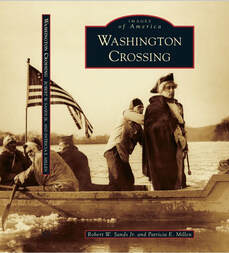
Washington Crossing book - The cover image is from a reenactment of the crossing as part of a 1947 fraternity gag by Rider University students.
|
Discovering Local History Online: Seminary Ave.
Presented by Douglas Dixon
|
Wed., July 6, 2022 - 7 pm ET
- In person at The Hopewell Theater, 5 South Greenwood Avenue, Hopewell, NJ - Or online over Zoom - Registration required - Click here Hopewell Public Library "Wednesday Night Out" Lecture Series Co-sponsored by the Hopewell Valley Historical Society and The Hopewell Museum How can we find out about our local history – people and families, places and businesses?
In this presentation, Doug Dixon of the Hopewell Valley History Project will demonstrate how researching in a variety of online resources (many free) can weave together interesting stories of our local history. The test case for this presentation is the apparently undistinguished Seminary Avenue, which turns out to have been a “starter street” for Hopewell since it was opened around 1880. The mix of subdivided buildings with apartments and storefronts provided places where young families and small businesses could establish themselves in a growing town – from barbers and bakers and butchers, to clothing and grocery stores, plus a theatre, firehouse, and library. Doug will explore the stories of the amazing variety of people and businesses that developed along this street, illustrated by sources including maps and photos, books and references, deeds and census records, newspaper articles and obituaries – and enhanced by the memories of local people and family members
Doug Dixon is an independent technology consultant and writer, now morphed into a history enthusiast. He is a board member of The Hopewell Museum and the Hopewell Valley Historical Society.
Over the past few years, Doug has developed the Hopewell Valley History Project (HopewellHistoryProject.org), working with some 90 local contributors to collect and freely share digital copies of local historical materials – now with some 500 documents and maps, 2800 images and videos, and an interactive historical map of Hopewell. As a software technologist, Doug specializes in Web technology, databases, and digital media. He has authored four books on digital media, published hundreds of feature articles, and presented over a hundred seminars and talks. Hopewell Public Library "Wednesday Night Out" Lecture Series
Co-sponsored by the Hopewell Valley Historical Society and The Hopewell Museum
|
Preserving Family Photographs
Presented by Gary Saretzky
|
Thurs., June 9, 2022 - 7 pm ET
Online virtual presentation via Zoom Registration Required -> Register here (through the Pennington Public Library) Since the introduction of photographic portrait studios in 1840, photographs have been among the most treasured of family records. However, while most photographs are long-lasting when stored optimally in archives, they are all too often prone to fading and discoloration in the home environment. In this presentation, Gary Saretzky will provide guidance on how the life of family photographs can be extended so that they can be passed down to future generations. The lecture includes examples of how old photographs can be enhanced or restored in the computer after digitization.
Gary D. Saretzky, archivist and photographer, worked as an archivist for more than fifty years at the State Historical Society of Wisconsin, Educational Testing Service, and the Monmouth County Archives, where he was County Archivist from 1994 to 2019. A member of the Photographic Materials Group of the American Institute for Conservation, Saretzky taught the history of photography at Mercer County Community College, 1977-2012. He has published more than 100 articles and reviews on the history of photography, photographic conservation, and other topics, including “Nineteenth-Century New Jersey Photographers,” in the journal, New Jersey History, Fall/Winter 2004. See his website at Saretzky.com.
Co-sponsored by the Hopewell Valley Historical Society, The Hopewell Museum, and the Pennington Public Library.
|
Hopewell Valley Heritage Week
|
May 21 - 30, 2022
Hopewell Valley Heritage Week is back, May 21 - 30, 2022, celebrating the rich heritage of the Hopewell Valley with a full week of events, some virtual and others outdoors. This year’s theme is If You Build It They Will Come—Early American Arts, Crafts & Trades in Hopewell Valley.
|
Pennington Historic District Walking Tour
Organizer: Pennington Borough Historic Preservation Commission
|
Two tours: Sat., May 28, 2022 - 2:00 - 3:00 PM and 3:30 - 4:30 PM
Free, but limited places - Pre-registration Required - Use links above Join Eric Holtermann and Jack Davis of the Pennington Borough Historic Preservation Commission for a 60-minute walking tour of Pennington’s Historic District. During the tour, Eric, an architect and preservationist, will offer insight into the district’s buildings, periods and styles, while Jack, a local history researcher, will add historical context about the town and people.
The tour is free. The walk will take about one hour, and will cover 1 mile. You will receive additional info upon registration. Wear comfortable shoes. We are offering the tour at two times: 2 pm and 3:30 pm. Click the links above to reserve a place. A Hopewell Valley Heritage Week event, co-sponsored by the Pennington Borough Historic Preservation Commission. |
American Indian Artifacts and Tools
Presented by the Hopewell Museum
|
Fri. and Sat., May 27 and 28, 2022
The Hopewell Museum, 28 E. Broad St., Hopewell, NJ Fri. May 27 - 10:30 am & 2 pm - Make Your Own Wampum Bracelet - Children 7 and older Sat. May 28 - 1 pm - Native American Artifacts from the Hopewell Valley Sat. May 28 - 1:45 pm - Native American Stone Tool Making - Jack Cresson Sat. May 28 - 3:15 pm - "The Arrowhead Roadshow" - Bring in artifacts to be identified Join our local archeological experts at the Hopewell Museum as we explore the tools and technologies of the American Indians of the Hopewell Valley—9,000 years ago to today. We'll highlight the skill and artistry of the Native American Indians of Hopewell Valley by examining the many types of stone tools they have left behind. This multipart program will include a discussion of the Hopewell Museum's American Indian Collection, a demonstration of Native American tool-making by a nationally known expert, and our “Arrowhead Roadshow” where you can bring your personal artifacts for identification by experts! See the Hopewell Valley Heritage Week event page for more information. |
Skills Developed by a Free Hunterdon County Black Man: 1754-1836
Presented by Larry Kidder
|
Tues., May 24, 2022 - 7 pm ET
Hopewell Branch of the Mercer County Library 245 Pennington-Titusville Rd., Pennington, NJ Free, but limited space - Registration Required -> Register here (through the Mercer County Library) This is the story of Jacob Francis who was born free in Amwell Township, served as an indentured servant to age 21, served in the Continental Army – including the Battle of Trenton – and New Jersey militia, then established himself against all odds as a successful farmer. He interacted with many enslaved people, including the woman he married and set free, and helped his son develop skills to be an important abolitionist seeking not just an end to enslavement but also racial equality. Throughout his life, Jacob developed many physical and mental skills needed to overcome the racist obstacles that society placed in his path. The life of Jacob Francis and the family he created with his wife, Mary, richly illustrates how human beings often have to reach deeply and persistently to acquire and use important skills.
Larry Kidder is a retired history teacher who taught for 40 years, including 32 years at The Hun School of Princeton. He is a graduate of Allegheny College (BA 1967, MS 1969) and served four years in the US Navy. Larry has been a volunteer historian and historical interpreter for the Howell Living History Farm in Hopewell for over 30 years and is a member of the board of the Princeton Battlefield Society where he focuses on educational programs and battlefield tours. He is a past president of the Hopewell Valley Historical Society and has served on the board for many years. The author of two books on rural New Jersey history and three on aspects of the American Revolution in Mercer County, Larry is a frequent speaker throughout New Jersey. He has also been a presenter at conferences on the American Revolution in Pennsylvania, Virginia, and New York. For more of Larry's projects and books, visit his website, wlkidderhistorian.com.
A Hopewell Valley Heritage Week event, co-sponsored by the Hopewell Valley Historical Society and the Hopewell Branch of the Mercer County Library. |
Seminary Avenue Historic Walking Tour
Presented by Douglas Dixon, Hopewell Valley History Project
|
Join Doug Dixon of the Hopewell Valley History Project for this one-hour historic walking tour of Seminary Avenue in Hopewell Borough – plus two more blocks to Gazebo Park. Explore the stories of the people and businesses of this nondescript street that helped to provide the initiative and energy to help a small village grow into a prosperous town.
The one block of Seminary Avenue off East Broad Street in Hopewell Borough is rather prosaic; It has no architecturally distinguished homes, or well-known buildings, or historical markers. But once it was opened around 1880 after the arrival of the railroad, Seminary became a “starter street” for Hopewell, a place to find subdivided buildings with apartments and storefronts where young families and small businesses could establish themselves in a new town, and grow and prosper. Tours will be held the first weekend of Hopewell Valley Heritage Week - Sat. 5/21 at 11 am & 2 pm, Sun. 5/22 at 1 pm & 3 pm, and Mon 5/23 at 2 pm. There is no cost, but places are limited, so registration is required. A Hopewell Valley Heritage Week event, co-sponsored by the Hopewell Public Library. See more information on the walking tour on the History Project site.
|
Liberty: Don Troiani's Paintings of the Revolutionary War
Presented by Matthew Skic
|
Mon., April 18, 2022 - 7 pm ET
Online virtual presentation via GotoMeeting Registration Required -> Register here (through the Mercer County Library) Note: The MCL uses GoToMeeting for video webinars - see GoToMeeting Installation Instructions (PDF) Join Matthew Skic, Curator of Exhibitions at the Museum of the American Revolution in Philadelphia, for an exciting look at the artistic career of Don Troiani, America's foremost historical military artist. For the very first time in a museum exhibit, nearly 50 of Don Troiani's original paintings of the Revolutionary War are now on display at the Museum of the American Revolution. Matthew will discuss Troiani's artistic process, how Troiani uses his collection of historic military antiques in his work, and the significance of Troiani's paintings to our understanding of the Revolutionary War. Liberty: Don Troiani's Paintings of the Revolutionary War is on view at the Museum of the American Revolution until September 5, 2022. Tickets and exhibit catalogs are available for purchase at amrevmuseum.org.
Matthew Skic serves as Curator of Exhibitions at the Museum of the American Revolution in Philadelphia. Originally from Hopewell, NJ, he worked as an historical interpreter at Washington Crossing State Park during high school. Matthew went on to study history at American University and interned for the Smithsonian’s National Museum of American History. He was a fellow in the University of Delaware’s Winterthur Program in American Material Culture and graduated with his master’s degree in 2016. Soon after graduation from the Winterthur Program, Matthew joined the curatorial team at the Museum of the American Revolution and helped open the Museum in 2017. He has curated multiple award-winning exhibitions and online projects since then. Matthew has also authored or co-authored three books: Among His Troops: Washington’s War Tent in a Newly Discovered Watercolor (2019), Cost of Revolution: The Life and Death of an Irish Soldier (2019), and Liberty: Don Troiani’s Paintings of the Revolutionary War (2021).
Co-sponsored by the Hopewell Valley Historical Society, The Hopewell Museum, and the Hopewell Branch of the Mercer County Library. |
Discussion Panel: Immigration Experiences in Hopewell Valley
Sun., March 20, 2022 - 3 pm ET
Online virtual presentation via Zoom
and in-person livestream at the Hopewell Branch of the Mercer County Library
Zoom Registration Required -> Register here (through the Pennington Public Library)
Livestream Registration Required -> Register here (through the Mercer County Library)
More Information (Pennington Public Library)
Online virtual presentation via Zoom
and in-person livestream at the Hopewell Branch of the Mercer County Library
Zoom Registration Required -> Register here (through the Pennington Public Library)
Livestream Registration Required -> Register here (through the Mercer County Library)
More Information (Pennington Public Library)
|
As part of the 2022 Big Read initiative, The Hopewell Museum, the Hopewell Valley Historical Society, and the Hopewell Branch of Mercer County Library are partnering with the Pennington Public Library to present a conversation on how local families with a primary, secondary or tertiary immigrant experiences move through this grand notion of the “American Dream.”
The NEA Big Read is a program of the National Endowment for the Arts in partnership with Arts Midwest. This year, the Pennington Public Library has organized an extensive program from February 26 through April 10, 2022, intending to bring our community together around one book and use this shared experience of reading, discussing and exploring the themes of the book as a stepping stone to learn from and listen to each other. The book selection for this year is the debut graphic novel memoir by Thi Bui, an intimate look at one family’s journey from their war-torn home in Vietnam to their new lives in America. |
|
Facilitator: Ian Burrow, Owner at BurrowIntoHistory LLC
Panelists:
Co-sponsored by the Hopewell Valley Historical Society, The Hopewell Museum, and the Pennington Public Library. |
The Revolutionary World of a Free Black Man: Jacob Francis, 1754-1836
Presented by Larry Kidder
|
Thurs., February 3, 2022 - 7 pm ET
Online virtual presentation via GotoMeeting Registration Required -> Register here (through the Mercer County Library) Note: The MCL uses GoToMeeting for video webinars - see GoToMeeting Installation Instructions (PDF) Born in Amwell Township to a free Black mother, Jacob Francis lived his 82-year life in a world of revolutionary change. He became caught up in the rising tide of revolution in the 1760s and 70s and served in the Continental Army, including at the Battle of Trenton, and then the New Jersey militia. Establishing himself as a farmer, he married an enslaved woman named Mary, freed her and they raised their eight children in the vicinity of Flemington during a period of rising interest in abolition. The story of Jacob Francis and his family provides us with an inside view of life in New Jersey in the late eighteenth and early nineteenth centuries and the revolutionary changes affecting the lives of both free and enslaved Black people.
Larry Kidder is a retired history teacher who taught for 40 years, including 32 years at The Hun School of Princeton. He is a graduate of Allegheny College (BA 1967, MS 1969) and served four years in the US Navy. Larry has been a volunteer historian and historical interpreter for the Howell Living History Farm in Hopewell for over 30 years and is a member of the board of the Princeton Battlefield Society where he focuses on educational programs and battlefield tours. He is a past president of the Hopewell Valley Historical Society and has served on the board for many years. The author of two books on rural New Jersey history and three on aspects of the American Revolution in Mercer County, Larry is a frequent speaker throughout New Jersey. He has also been a presenter at conferences on the American Revolution in Pennsylvania, Virginia, and New York. For more of Larry's projects and books, visit his website, wlkidderhistorian.com. Co-sponsored by the Hopewell Valley Historical Society, The Hopewell Museum, and the Hopewell Branch of the Mercer County Library. |
Watermills of the Stony Brook-Millstone Watershed
Presented by Richard Hunter
|
Sun., January 23, 2022 - 2 pm ET
- Attend in person at the Watershed Institute, or via online Zoom virtual presentation - Registration Required for either option: Register here through the Watershed Institute People have long been drawn to water, out of basic necessity, as a source of food resources, and more recently, for the power it can provide. Explore the history of the water-powered industry and the several dozen or so watermills of the Stony Brook-Millstone watershed. These range in date from the early 18th through the early 20th centuries, and cover a wide range of mill types, mostly grist and sawmills, but also many others, e.g., fulling, carding, woolen, cotton, flax, plaster, oil, clover, and more. Examine how these mills supported and shaped the communities within the watershed.
Richard Hunter has had a lifelong interest in mills going back to his pre-U.S. existence in the UK. His doctoral dissertation at Rutgers was a historical geographical study of mill siting in the Stony Brook-Millstone and North Branch of the Raritan watersheds. In his professional career as an archaeologist and cultural resource management specialist from the late 1970s onwards he has researched and excavated numerous water-powered industrial sites of many different types throughout the state and Mid-Atlantic region. He has a particular obsession with tide mills, which sadly are a hydro-geographic impossibility in the Stony Brook-Millstone watershed. Richard is founder and President of Hunter Research, Inc. a Trenton-based historic preservation and cultural resources consulting business, and has served on numerous state and local boards and commissions. He is author of many articles and co-author (with Richard Porter) of Hopewell: A Historical Geography.
You can attend this event in person or online - Registration is required for either option:
Co-sponsored by the The Watershed Institute, the Hopewell Valley Historical Society, and The Hopewell Museum. |


